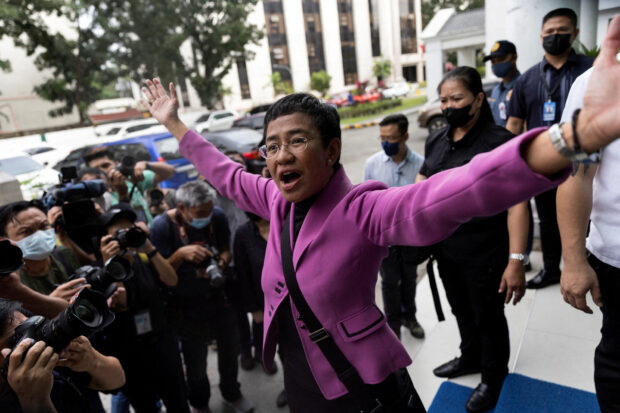
FILE PHOTO: Rappler CEO and Nobel Laureate Maria Ressa gestures after a Manila court acquitted her from a tax evasion case, outside the Court of Tax Appeals in Quezon City, Philippines, January 18, 2023. REUTERS/Eloisa Lopez/File Photo
UPDATED MANILA, Philippines — A Pasig court on Tuesday acquitted Nobel Peace Prize laureate and Rappler chief executive officer Maria Ressa and Rappler Holdings Corporation (RHC) of tax evasion.
The ruling was promulgated by Pasig City Regional Trial Court Branch 157, Presiding Judge Ana Teresa T. Cornejo-Tomacruz. The decision was handed down eight months after the Court of Tax Appeals (CTA) acquitted Ressa and RHC of four counts of tax evasion.
READ: Rappler, Maria Ressa acquitted of tax evasion charge
Ressa, who won the Nobel Peace Prize in 2021 alongside a Russian journalist, is head of Rappler, which gained recognition for its rigorous scrutiny of former president Rodrigo Duterte and his deadly war on drugs.
After announcing the verdict, Ressa told reporters she felt “good” about the court’s decision.
“We share this with our colleagues in the industry who have been besieged by relentless online attacks, unjust arrests and detentions, and red-tagging that have resulted in physical harm,” Rappler also said in a statement.
“All the dismissed tax cases were based on the false and flimsy premise that, when Rappler issued Philippine Depositary Receipts in 2015, it was not raising capital but earning a taxable profit, which it supposedly willfully did not declare. We are pleased that the court saw through that,” it added.
With the dismissal of the tax case, two cases against Rappler remain — the appeal on the cyber libel case pending before the Supreme Court and the appeal on Rappler’s closure order before the Court of Appeals.
Ressa, 59, is currently on bail and was convicted in 2020 for cyber libel in one of several cases against the website filed by government agencies. She maintained those cases were politically motivated.
President Ferdinand “Bongbong” Marcos Jr., who has been in office for 14 months, has said he would not interfere in the court cases against Rappler.
Rappler is still operating unhindered pending its appeal against a closure order from the securities regulator.
The Philippines is ranked 132 out of 180 countries on the World Press Freedom Index, describing its media as “extremely vibrant despite the government’s targeted attacks and constant harassment” against ” too critical journalists.”